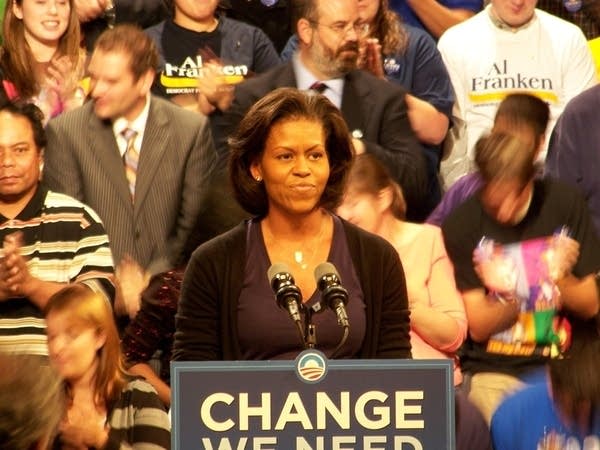Michelle Obama fires up supporters in Minnesota
Go Deeper.
Create an account or log in to save stories.
Like this?
Thanks for liking this story! We have added it to a list of your favorite stories.

Most of Michelle Obama's remarks focused on her and her husband's working class backgrounds. She described her father, a firefighter who developed multiple sclerosis in the prime of his life.
She reminded people that Barack Obama was raised by a single mother and grandparents who struggled through poverty. She said most Americans are just like their families.
"Hard-working people who don't want government to solve all their problems. Folks in this country aren't asking for much," said Obama. "They just want to be able to do what my dad did for me -- get up, go to work every day and earn a decent living."
Barack Obama is not the first African-American candidate to lead his white opponent in the polls in a major political campaign. In the 1980s and early '90s, a pattern emerged when a black candidate faced off against a white candidate.
Turn Up Your Support
MPR News helps you turn down the noise and build shared understanding. Turn up your support for this public resource and keep trusted journalism accessible to all.
"The only thing I'm concerned about is the prejudice that some people have against [Barack Obama]."
On several occasions, polls showed the black candidate leading by a wide margin. But on voting day he'd win by a few hundred votes or lose entirely.
It came to be called the Bradley Effect, for the former mayor of Los Angeles, Tom Bradley, who ran for governor of California.
The Bradley effect means voters surveyed say they'll vote for the black candidate when they intend to vote for the white candidate, or they simply won't commit to a candidate for fear of appearing racist.
Patty White is a stay-at-home mom of four children, who was at today's Rochester rally. She says she agrees with most of Obama's policies.
"[But] the only thing I'm concerned about is the prejudice that some people have against him," said White.
White says her parents were racist, and they passed on those prejudices to her as a child.
"I had to learn in my 20s to overcome. And I'm happy to say that I think I've overcome a great deal of them. It's taken a generation," said White. "My kids don't even know what that's about. When I tell them what grandma and grandpa taught me they are amazed, and that's just gone now. And I think we're in a time in our political season where that is how it's going to be."
In recent national news stories, political pollsters say the Bradley Effect could account for as much as 6 percent of Obama's lead in the polls. That would put the race between Obama and McCain much closer than current polls suggest.
But Adam Berinsky says voters should take the poll numbers at face value. Berinsky is a political science professor at Massachuesetts Institute of Technology, and has studied the Bradley Effect.
"I think the important thing is to take each election in context. And to think how are people expressing their choices in the context of a given election," said Berinsky.
Berinsky says he does not believe the Bradley Effect will play a role in this election. He says voters talk about this election in terms of issues, not personality, and there's no reason for them to lie to pollsters when they call. He says voters can couch their prejudice, if they need to, by talking about experience or policy.
Bradley Effect or not, voter turnout matters, too. In Rochester today, Michelle Obama urged the crowd to campaign where she and her husband cannot, in their homes and neighborhoods.
"There are people within your own communities and churches, or maybe even your own families, who maybe they are undecided or maybe they're still not paying attention. That's where you come in," Obama said.
Michelle Obama held a similar campaign event in St. Paul late this afternoon.



